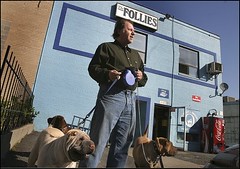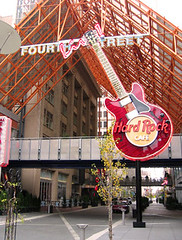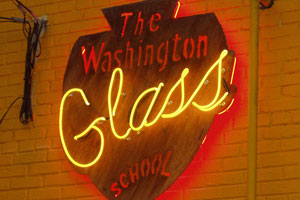The "strip club" meeting is really about the relocation of gay clubs being displaced by the baseball stadium
 Robert Siegel will be one of the entrepreneurs affected by the creation of a new baseball stadium in D.C. (Lucian Perkins -- The Washington Post)
Robert Siegel will be one of the entrepreneurs affected by the creation of a new baseball stadium in D.C. (Lucian Perkins -- The Washington Post)I just learned that the "strip clubs" mentioned in the previous blog entry are the gay-oriented establishments being displaced from the baseball stadium area. As we all know, these businesses are looking for another place to locate, although I don't see why land can't be carved out for them in the greater stadium area anyway... although Jerry Reinsdorf and Bud Selig might not be into it.
M Street Live + The Follies could be a new direction for the Cordish company. (See this entry, "Batter up, 'M Street Live.' Is inauthenticity on the horizon for the Anacostia SE Waterfront?," from December.)
 Fourth Street Live in Louisville is a Cordish Compnay project. Cordish is one of the companies that has been picked by the Anacostia Waterfront Corporation to create entertainment uses in the stadium area.
Fourth Street Live in Louisville is a Cordish Compnay project. Cordish is one of the companies that has been picked by the Anacostia Waterfront Corporation to create entertainment uses in the stadium area.It's probably worth your going to the meeting (I'm not going to) if only to see how crazed a public meeting can become in changing District of Columbia neighborhoods. I'm guessing the tenor of the meeting will be quite homophobic, judging by how I have seen these kinds of meetings work in the past, and my sense of the quality of the leadership in that area.
The Post and the local gay press (Washington Blade, Metro Weekly) have been covering the displacement of these clubs for some time, the Post in this article "No Joy in Stadiumville: An Unbuilt Ballpark Casts Its Shadow on Southeast," from 2004, and Metro Weekly in this one, "Eminent Eviction: Gay businesses in Southeast respond to the D.C. government's stadium land-grab filing," and "Stadium would displace gay clubs: Kameny calls for zoning exemption for new club sites," from the Blade.
The Metro Weekly article sheds light on tonight's meeting, quoting Bob Siegel, the leading entrepreneur in the Southeast DC scene for gay business enterprises:
Siegel is trying to cover his bases, however, looking for a new location for Glorious Health and Amusements. He declined to give details, beyond noting a warehouse on West Virginia Avenue NE that may suit his needs.
''I really am very hopeful,'' Siegel says. ''The building I'm looking at is 20-times larger than the existing area. It's room enough for all of the adult amusements. Maybe I will have my Gay Disneyland.... I believe that Glorious Health Club (sic) could relocate to any part of the city. It's just my tenants with the liquor licenses who will be having a problem.''
This warehouse is located in Ivy City.
Like my complaints about the displacement of the Washington Sculpture Center, which was covered among other issues, in this article from the Thursday District Extra, "Landowners Fight to Stay Put: Feb. 7 Move-Out Date Pending in D.C. Court," I think that the DC Government has really failed the active businesses and arts uses that are located in the stadium area by providing miniscule support in terms of relocation assistance. This is particularly important given the difficulty of finding comparable pieces of land at affordable prices. The uses like these located over there because either (1) they needed a big, cheap old building (Sculpture Center, Glass School) or (2) it was worth locating in a lightly populated area because of the potential controversy of the use (gay and other clubs, late night night life).
(I wrote about the baseball stadium forced displacement of arts-related uses in this entry, "Mumblings and grumblings," last month.)
These problems of relocation have been "produced" by the political economy of the focus on baseball, and it's an unfortunate consequence that could have and should have been addressed in a proactive fashion, rather than being ignored.
 The Washington Glass School is moving to Arlington County, Virginia, having been displaced by the forthcoming baseball stadium in Southeast DC.
The Washington Glass School is moving to Arlington County, Virginia, having been displaced by the forthcoming baseball stadium in Southeast DC.Index Keywords: baseball



0 Comments:
Post a Comment
<< Home